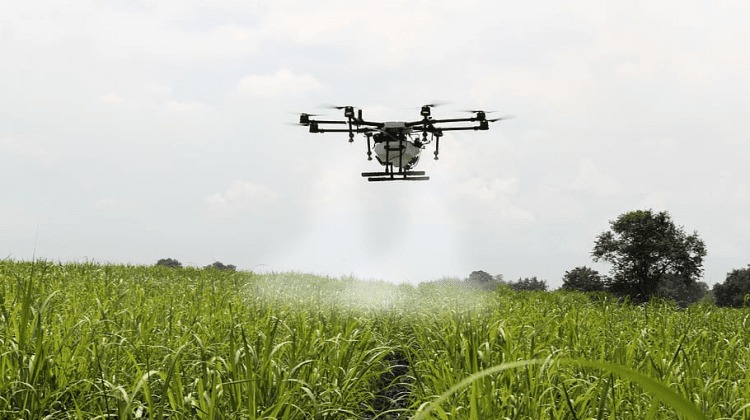The Kisan Drone Scheme is an initiative by the Government of India to promote drone use in the agriculture sector. Launched in February 2022, this scheme aims to make drone services affordable and accessible to farmers across the country.
Background
Drones or Unmanned Aerial Vehicles (UAVs) have emerged as an important technology for agriculture in recent years. Equipped with advanced sensors and imaging capabilities, drones can be deployed for various agriculture applications like crop monitoring, pesticide spraying, crop inspection, soil and field analysis etc.
The use of drones in agriculture provides several benefits:
- Real-time crop monitoring: Drones can capture images and videos that can be digitally processed to assess crop growth, health and yield estimates. This allows farmers to take quick actions.
- Precise spraying: Drones enable targeted spraying of pesticides and fertilizers which improves efficacy and reduces wastage.
- Soil analysis: By using advanced imaging technologies, drones can help analyze soil health – an important factor for crop productivity.
- Crop inspection: Drones provide speedy access for inspecting crops eliminating the need to walk through the entire field.
Despite these benefits, the high cost of acquisition and maintenance of drones prevented their widespread adoption, especially by small and marginal farmers with limited means.
To address this constraint, Government of India launched the Kisan Drone Scheme to provide subsidies and incentives to make drones affordable to farmers.
Key Features
The key features of the Kisan Drone Scheme are:
Financial Assistance
The scheme provides financial assistance up to 100% of the cost of drones for public entities like agricultural universities and ICAR institutes who use it for agricultural research and farmer outreach.
Farmers cooperative societies and rural entrepreneurs can avail a subsidy between 50% to 100% of the cost of drones based on how they plan to use drone services.
Focus Areas
The scheme focuses on providing drones for five broad areas:
- Crop assessment/health monitoring
- Digitization of land records
- Spraying of insecticides
- Crop insurance & claim settlement
- Soil and crop nutrients testing
Emphasis on “Made in India”
The scheme promotes the use of drones manufactured by Indian drone startups and companies approved under the DGCA regulatory framework.
This helps boost India’s drone manufacturing ecosystem.
Customized Hiring Centers
To ensure easy access for all farmers, the scheme encourages establishment of Custom Hiring Centers (CHCs) at village level which can offer drone operations services.
Financial assistance up to 75% subsidy on drone costs is available for qualified drone pilot entrepreneurs to set up CHCs.
Implementing Agencies
The Kisan Drone Scheme is implemented through two nodal implementing agencies:
- National Bee Board (NBB) – For beneficiaries wanting to provide drone based services
- Agriculture Skill Council of India (ASCI) – For drone pilot training related proposals
These agencies act as single window clearance mechanisms for processing applications and disbursing subsidies under the Kisan Drone scheme.
Eligibility Criteria
The eligibility criteria to apply for the Kisan Drone scheme is as follows:
For Individual Owned Drones
- Only farmers with a valid land ownership document can apply
- Preference to marginalized farmers with land holdings under 2 hectares
- Drone acquired should weigh under 25 Kg
- Applicant should furnish a tentative plan towards use of the drone in farming along with projected costs and revenues
For Establishing Custom Hiring Centers
- Applicant should have passed class 12th examination
- Should possess a valid drone pilot license from DGCA
- Own suitable land space to establish drone port and conduct operations
- Business plan towards operating custom hiring center including hiring charges for drone services
For Agricultural Institutions
- Should be a recognized public funded agricultural university, ICAR center or Krishi Vigyaan Kendra
Besides the above eligibility criteria, applicants need to furnish other documents like address proof (Aadhaar Card), bank account details etc.
Beneficiaries Under Kisan Drone Scheme
Over 16,000 applications from across 29 States and UTs were received under the Kisan Drone Scheme as per latest government update in June 2022.
The following is a breakup of beneficiaries supported under the scheme so far:
| Type of Beneficiary | No.of Beneficiaries | Subsidy Amount Disbursed |
| Individual Farmers | 1210 | 11.16 Cr |
| FPO/Cooperative Societies | 21 | 2.05 Cr |
| Agricultural Institutions | 12 | 1.35 Cr |
| Rural Entrepreneurs | 6 | 0.68 Cr |
As per above data, majority of the subsidies have been allotted to marginalized farmers with land holdings under 2 hectares to purchase drones for farming activities.
To boost service delivery, licenses have also been issued to empaneled drone pilot entrepreneurs to establish Custom Hiring Centers in over 200 locations across India under the scheme.
Impact
The Kisan Drone Scheme though still in initial stages of deployment, has made some noticeable impact:
- Cost reduction: The subsidy support has reduced the entry cost of acquiring drones resulting in improved adoption among farmers. Light-weight drones are now available between Rs.60-80K.
- Service delivery: To ensure access for all category of farmers, drone applications for agriculture are being delivered through rapidly expanding network of Custom Hiring Centers.
- Entrepreneur opportunities: The scheme has created new self-employment openings for youth in rural areas in the drone services space. Over 16 pilot training centers have been set up churning out skilled drone operators.
Besides the above impact, drones are also playing a constructive role across activities ranging from land records digitization to crop insurance claim processing – contributing effectively towards building a robust agricultural ecosystem.
Challenges
While concerted efforts are being put to drive drone adoption in Indian agriculture, some challenges still exist:
- Regulatory constraints: Industry participants have highlighted practical difficulties in obtaining flight permissions especially with respect to flying drones beyond visual line of sight (BVLOS). Currently only experimental flights are allowed for BVLOS which hampers coverage.
- Limited payload capacity: The light-weight drones being supplied under the agricultural drone subsidy scheme have payload limitations around 10 Kg. This restricts extensive usage in spraying fertilizers and pesticides beyond very small farm land holdings.
- Lack of rural infrastructure: The nascent drone service industry lacks ground infrastructure like drone charging pads, parking stations etc. in rural hinterlands hampering seamless operations.
- Low awareness levels: There is inadequate information among farmers around potential benefits and community usage models of drones limiting adoption by sharecroppers and oral lessees.
The Road Ahead
The Kisan Drone Scheme has provided a robust starting push towards unlocking the power of drone technology for Indian agriculture.
Going forward, the following policy measures would help harness the full potential of this emerging technology:
- Create comprehensive guidelines and provisions for promoting drone operations beyond visual line of sight (BVLOS).
- Support establishment of a wide network of drone infrastructure facilities in rural areas like drone ports, charging pads, storage hubs etc.
- Drive extensive demonstrations and pilots on full-scale applications of drone technology across Indian agro-climatic zones to build farmer confidence.
- Enhance the scope and coverage of the Kisan Drone scheme by increasing subsidy outlays and expanding the number of empaneled implementation partners.
- Launch awareness drives and incubator programs focused specially on youth and rural entrepreneurs to build adequate capacities across the drone services value chain.
The roadmap may have turbulences but the direction is set right – the rise of drones in Indian agriculture through supportive policy interventions can drive a new wave of socio-economic empowerment in rural areas!


